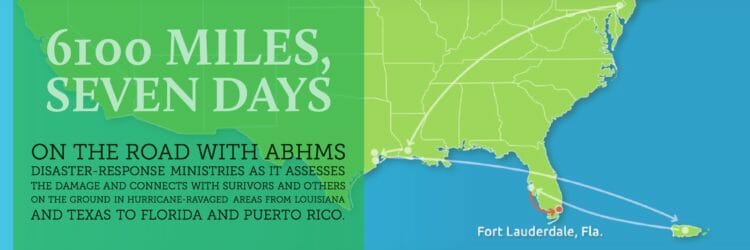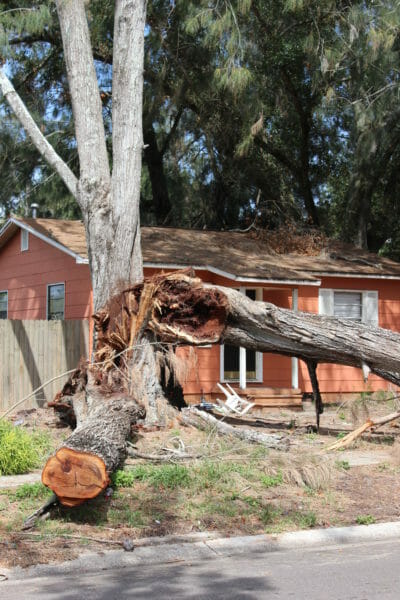6,100 miles, seven days: Is God trying to get our attention?

Day 7 — In worship on Sunday at First Baptist Institutional Church, St. Petersburg, Fla., pastor Dr. Wayne G. Thompson pointed out to his congregation that only one piece of the roof fell off during Hurricane Irma and that their church was the only one in the neighborhood that didn’t lose electrical power.
 Irma may have spared the church, but its members didn’t fare as well. The hurricane’s winds downed huge trees across St. Petersburg, some of them ending up in members’ front yards. For one 70-something member living on a fixed income, the huge pieces of dead wood in her front yard are a constant reminder of the cleanup issue now being played out between the Federal Emergency Management Agency and insurance companies.
Irma may have spared the church, but its members didn’t fare as well. The hurricane’s winds downed huge trees across St. Petersburg, some of them ending up in members’ front yards. For one 70-something member living on a fixed income, the huge pieces of dead wood in her front yard are a constant reminder of the cleanup issue now being played out between the Federal Emergency Management Agency and insurance companies.
Florida, the last stop on our disaster-response assessment journey, proved to be yet another example of the ways hurricanes rip up lives as well as the landscape.
In Ft. Lauderdale, Dr. Rosalind Osgood, CEO of Mount Olive Development Corp. (MODCO), spoke of a kind of devastation that can go unseen—food insecurity.
MODCO, the nonprofit community outreach arm of New Mount Olive Baptist Church, serves the most impoverished area of Broward County. Here, the average annual income of a six-member family is $31,000. For these working poor, the domino effect of the loss of eight days of electrical power meant lost work days and the loss of food in refrigerators. On top of that, with schools closed for eight days, children who receive free school breakfast and lunch were home, needing two more meals a day. The loss of income combined with extra expenses, even as small as buying batteries for flashlights, created real economic hardship.
Within 48 hours of the storm, MODCO set up a feeding program that grew from 50 meals served the first day to more than 1,500 meals served last week. When money for the feeding program ran out, American Baptist Home Mission Societies (ABHMS) released $5,000 of One Great Hour of Sharing funds, on behalf of American Baptist Churches USA, to support the program.
On Sunday, when Thompson spoke to his congregation about Irma’s gentle touch on the church, he said, “Our being spared was not to rejoice, but for us to accept responsibility.”
That goes, not just for members of First Baptist Institutional Church, but for all of us. The job of disaster recovery cannot be done by only a few. It requires many organizations and individuals working as partners toward one goal—bringing healing and hope to those whose lives have been torn asunder.
At a lunch that MODCO held for seniors yesterday, the Rev. Frank Kennedy, executive pastor, New Mount Olive Baptist Church, challenged those gathered: “We have been exposed to colossal catastrophe. If God is trying to get our attention, what is our response?”
ABHMS is ready for the challenge of response. Will you accept the challenge, too?
Please join with us on the long journey of healing from the devastation of hurricanes Harvey, Irma and Maria through your prayers and donations to One Great Hour of Sharing.
Part six of a multiple part series as American Baptist Home Mission Societies (ABHMS) takes American Baptists on the road with ABHMS Disaster-response Ministries as it assesses the damage and connects with survivors and others on the ground in hurricane-ravaged areas from Louisiana and Texas to Florida and Puerto Rico.
Susan Gottshall is American Baptist Home Mission Societies Associate Executive Director, Communications.

